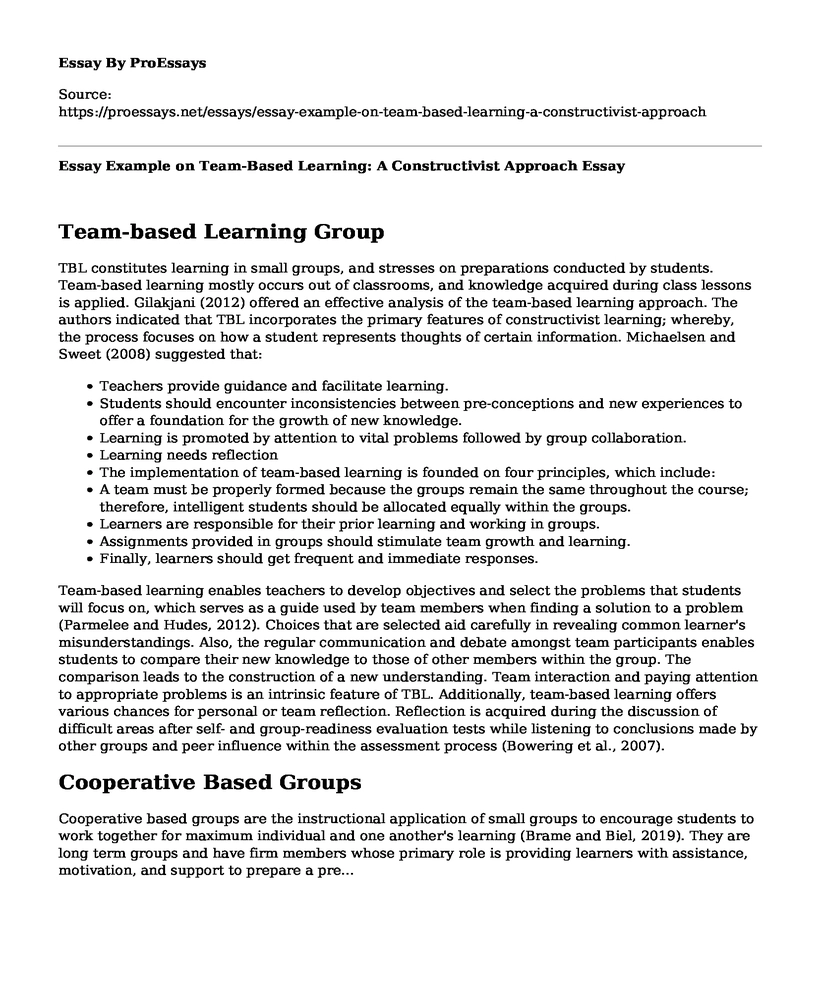Team-based Learning Group
TBL constitutes learning in small groups, and stresses on preparations conducted by students. Team-based learning mostly occurs out of classrooms, and knowledge acquired during class lessons is applied. Gilakjani (2012) offered an effective analysis of the team-based learning approach. The authors indicated that TBL incorporates the primary features of constructivist learning; whereby, the process focuses on how a student represents thoughts of certain information. Michaelsen and Sweet (2008) suggested that:
- Teachers provide guidance and facilitate learning.
- Students should encounter inconsistencies between pre-conceptions and new experiences to offer a foundation for the growth of new knowledge.
- Learning is promoted by attention to vital problems followed by group collaboration.
- Learning needs reflection
- The implementation of team-based learning is founded on four principles, which include:
- A team must be properly formed because the groups remain the same throughout the course; therefore, intelligent students should be allocated equally within the groups.
- Learners are responsible for their prior learning and working in groups.
- Assignments provided in groups should stimulate team growth and learning.
- Finally, learners should get frequent and immediate responses.
Team-based learning enables teachers to develop objectives and select the problems that students will focus on, which serves as a guide used by team members when finding a solution to a problem (Parmelee and Hudes, 2012). Choices that are selected aid carefully in revealing common learner's misunderstandings. Also, the regular communication and debate amongst team participants enables students to compare their new knowledge to those of other members within the group. The comparison leads to the construction of a new understanding. Team interaction and paying attention to appropriate problems is an intrinsic feature of TBL. Additionally, team-based learning offers various chances for personal or team reflection. Reflection is acquired during the discussion of difficult areas after self- and group-readiness evaluation tests while listening to conclusions made by other groups and peer influence within the assessment process (Bowering et al., 2007).
Cooperative Based Groups
Cooperative based groups are the instructional application of small groups to encourage students to work together for maximum individual and one another's learning (Brame and Biel, 2019). They are long term groups and have firm members whose primary role is providing learners with assistance, motivation, and support to prepare a pre...
Cite this page
Essay Example on Team-Based Learning: A Constructivist Approach. (2023, Aug 08). Retrieved from https://proessays.net/essays/essay-example-on-team-based-learning-a-constructivist-approach
If you are the original author of this essay and no longer wish to have it published on the ProEssays website, please click below to request its removal:
- Comprehensive Early Reading Plan - Education Essay Example
- How Critical Thinking Can Help Our Careers? - Essay Sample
- Child Behavioral Health Essay
- Basics of Jean Piaget's Theory and Erick Erickson's Life Stages Theory Essay
- The Theory of Extrinsic Motivation Paper Example
- CPS Should Do a Lot to Support Student Living With Disabilities - Article Analysis Essay
- Free Essay Sample on Head Nurse: A Leadership Role in Healthcare







